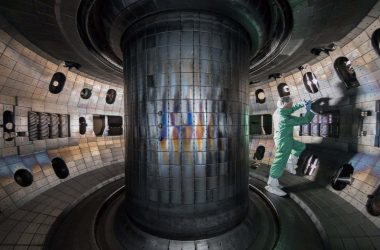Scientists have developed a quantum engine that harnesses the shifting quantum nature of particles to generate power. This breakthrough could have significant implications for the future of quantum technologies.
All particles can be classified as either fermions or bosons, and their behavior in larger groups depends on this categorization. Researchers at the University of Kaiserslautern-Landau in Germany, led by Artur Widera, have created an engine using a collection of atoms that can transition between behaving like bosons and fermions.
The distinction between these two types of particles becomes most apparent in the quantum realm, particularly at extremely low temperatures. The team built their engine using a few hundred thousand lithium atoms that were cooled to temperatures very close to absolute zero.
By manipulating magnetic fields, the researchers were able to make the lithium atoms behave either as a group of fermions or, when they formed molecule-like pairs, as a group of bosons. They then compressed and converted the atoms from bosons to fermions, increasing their collective energy. The atoms were subsequently allowed to expand, and the magnetic fields were adjusted to turn them back into bosons, decreasing their overall energy. This process resembles the compressing and expanding of fluids in conventional engines.
Currently, the ultracold atom engine achieves an efficiency of about 25%, but Widera believes it can be improved. The concept of a purely quantum form of energy driving an engine is groundbreaking and distinct from traditional machines that cannot exploit the quantum properties of fermions and bosons.
Sebastian Deffner at the University of Maryland, Baltimore County, highlights the importance of exploring the potential technological advantages of quantum engines. Gabriele De Chiara at Queen’s University Belfast suggests that, if made more practical, these engines could be used to charge quantum batteries or cool down warm quantum computers to reduce errors.
Data
- Researchers: Artur Widera and colleagues
- Affiliations: University of Kaiserslautern-Landau, Germany
- Topics: Quantum Mechanics, Quantum Physics












